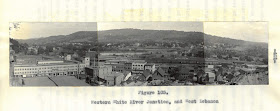 Although Torbert's research is interesting, especially when discussing the move from rural to urban environments in the 1800s, we were most fascinated by the photographic prints that he pasted into the pages of his
Although Torbert's research is interesting, especially when discussing the move from rural to urban environments in the 1800s, we were most fascinated by the photographic prints that he pasted into the pages of his dissertation. Images of White River Junction, West Lebanon, and Lebanon abound, and each one provides a captivating portal back to life in a small rural town in the 1920s. Perhaps the photos are so particularly compelling because Torbert went on to be an award-winning amateur photographer.
Torbert was evidently a man meant to be outdoors and in the field. He initially was a professor of geography at San Jose State College, but soon shifted into a more active role: he worked with the Tennessee Valley Authority for several years before moving into successive international positions that revolved around his specialty in economic geography. From 1950 to 1951, he worked on a reclamation program in Haiti. Soon after, Torbert headed to Afghanistan as the chief planning engineer for an irrigation project that was meant to bring water to 3.5 million acres of farmland.
 However, after only a few months there, he contracted bulbar polio, a particularly nasty variant of the disease which attacks the brain stem. At first, he and Elise, his wife, assumed that he had the flu. Within two days, his arms and vocal cords were paralyzed. A week later, after being airlifted out of the country on board the US Ambassador's plane, Torbert passed away in the Seventh Day Adventist hospital in Karachi, Pakistan. In a letter home, his wife said that she was "not prepared for the rapid progress of the disease nor for its fatality," that Norbert never regained consciousness enough to realize he had polio, and that "he remained sweet, patient and cheerful until the very end." Soon after, the United States Department of the Interior awarded him its highest honor, the Distinguished Service Award. At the awards convocation, Douglas McKay, Secretary of the Interior, described Torbert as "broad in his thinking, considerate in his approach, firm in his beliefs, skillful in his operations, and unyielding in his devotion to purpose."
However, after only a few months there, he contracted bulbar polio, a particularly nasty variant of the disease which attacks the brain stem. At first, he and Elise, his wife, assumed that he had the flu. Within two days, his arms and vocal cords were paralyzed. A week later, after being airlifted out of the country on board the US Ambassador's plane, Torbert passed away in the Seventh Day Adventist hospital in Karachi, Pakistan. In a letter home, his wife said that she was "not prepared for the rapid progress of the disease nor for its fatality," that Norbert never regained consciousness enough to realize he had polio, and that "he remained sweet, patient and cheerful until the very end." Soon after, the United States Department of the Interior awarded him its highest honor, the Distinguished Service Award. At the awards convocation, Douglas McKay, Secretary of the Interior, described Torbert as "broad in his thinking, considerate in his approach, firm in his beliefs, skillful in his operations, and unyielding in his devotion to purpose."To see Nat Torbert's dissertation, including some amazing views of early 20th-century Lebanon, ask for Alumni T63e.


No comments:
Post a Comment